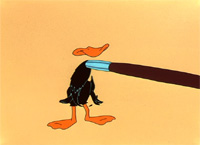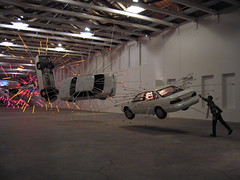Thoughts on Creators, Divine and Human
 "That, which can change us, is within us"
"That, which can change us, is within us""When I attempt something of my own design, I lose that peace"
These were lines from different testimonies at meeting this morning. One line led me, the other line I opposed.
A couple days ago, I poo poo'd Sibyl for saying that she doesn't feel that she is the one writing her plays, but more along the lines of channeling from some ineffable source. It's a common sentiment. Somehow sitting in Quaker meeting got me to think of Frank Miller and Sin City. In the collection of the first volume, Miller writes that he didn't expect the "Marv" story to go on so long, but that he had no choice, Marv wouldn't quit. Despite the vicious violence that Marv exerts, he is obviously a hero. He survives and strives because it's in his character, and at the end, he accepts his punishment at the electric chair because he accomplished his goals, far beyond what his creator first imagined.
Two thoughts come out of this. First, human striving is it's own reward and goal. Second, that writers, creators and audiences, delight when their characters take off on their own, writing themselves through trials, victories and defeats... why should this be any different for our creator.
In the first thought, it makes more satisfying the end of Goethe's Faust. After spending 5+ hours watching Faust travel with and benefit from his time with Mephisto, at Faust's death, Mephisto leaves empty handed and Faust's soul goes to Heaven. Believe it or not, there is a similarity with Frank Miller's Marv. Demonic in their adventures, both remain true to themselves, Faust to his human striving, Marv to his vengeance. As an audience, we are compelled with the nature of their struggles; Faust's realizing that power does not bring happiness; Marv's escalating danger as he discovers Goldie's murderer.
The second thought is closely related, and illustrates why I don't believe in an intervening God. The best characters are envisioned by their creators with everything to take them through the story whether or not the ending is pleasant. Note too, how stories and characters disappoint when their creator clearly jerks them apart from what their soul (for lack of a better term) would otherwise choose. Tolstoy can't save Anna Karenina by writing in a good shrink. Likewise, I believe our creator set us in motion, and like fictional characters, we make choices, we determine action. For God to intervene to answer our prayers, and undermines our life, which is to say, the story.
Another thread to consider, is the nature of worship. When has a fictional character worshiped it's own creator? Doing so suggests no self determination on the part of the character, and unbelievable arrogance on the part of the creator. Though God is god and we are mortals, there is an interesting juxtaposition. Do we not celebrate the creator by loving the creation: the characters, the setting, the opportunities? Furthermore, characters tend to regard their creators like Daffy Duck did Chuck Jones ( in Duck Amuck), teasing and fighting efforts to erase body parts and draw ridiculous situations. But there is still a bit of love, affection and joy in that tension. Could a similar relationship lies between our creator and ourselves?
Returning to the first two lines. I do feel that which can change us lies within us. It is part of our creation, endowed by our creator. But in contrast to the next line, perhaps we should not pray for peace so much as we should pray for striving, it makes for a better story.



0 Comments:
Post a Comment
<< Home